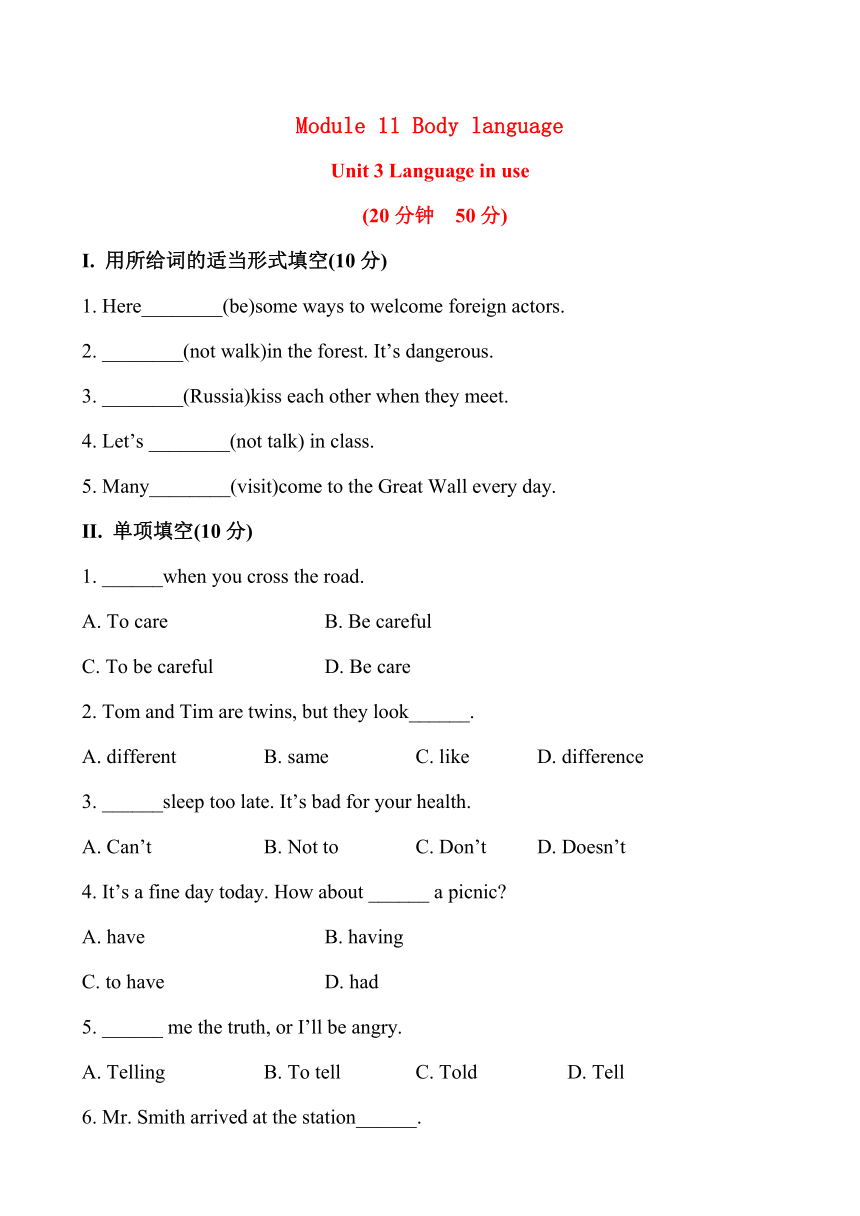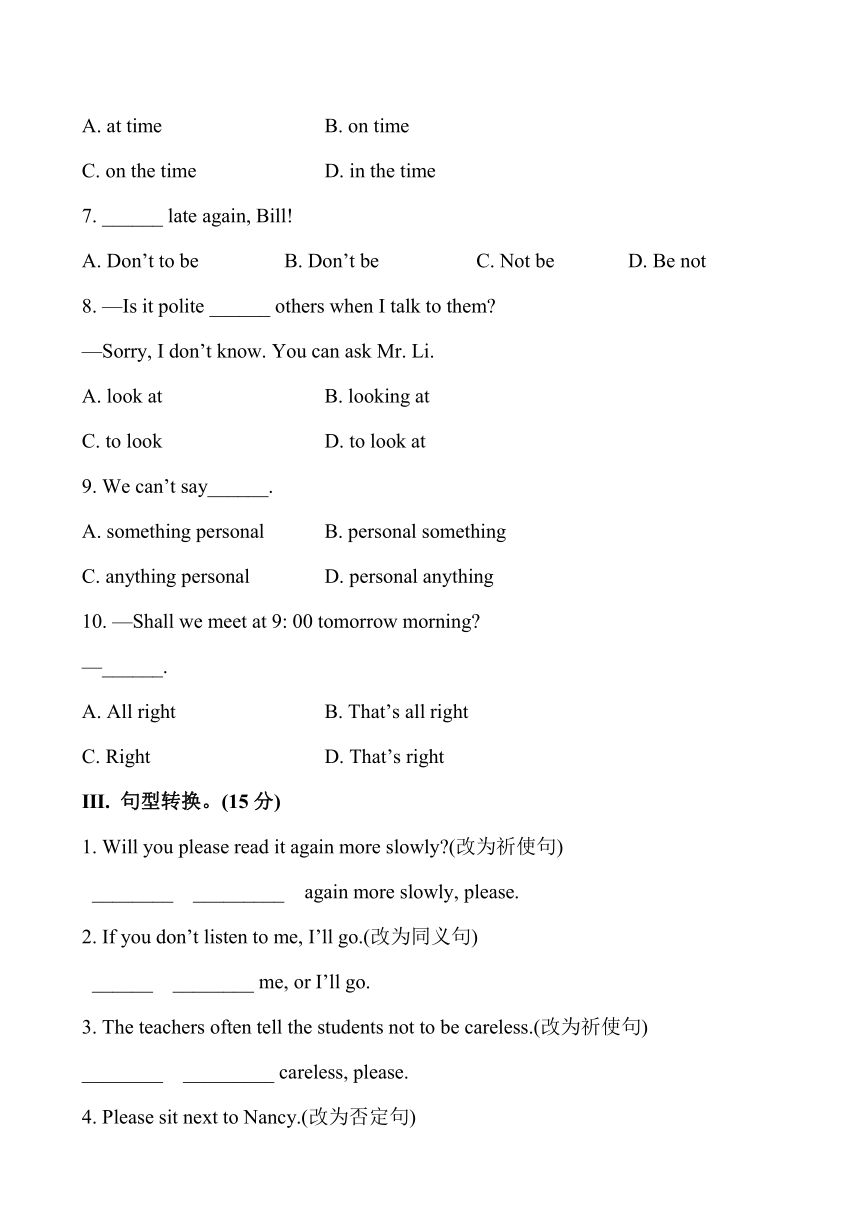Module 11 Body language Unit 3 Language in use 单元测试(无答案)
文档属性
| 名称 | Module 11 Body language Unit 3 Language in use 单元测试(无答案) |  | |
| 格式 | zip | ||
| 文件大小 | 28.7KB | ||
| 资源类型 | 教案 | ||
| 版本资源 | 外研版 | ||
| 科目 | 英语 | ||
| 更新时间 | 2016-05-23 19:00:57 | ||
图片预览


文档简介
Module 11 Body language
Unit 3 Language in use
(20分钟 50分)
Ⅰ. 用所给词的适当形式填空(10分)
1. Here________(be)some ways to welcome foreign actors.
2. ________(not walk)in the forest. It’s dangerous.
3. ________(Russia)kiss each other when they meet.
4. Let’s ________(not talk) in class.
5. Many________(visit)come to the Great Wall every day.
Ⅱ. 单项填空(10分)
1. ______when you cross the road.
A. To care B. Be careful
C. To be careful D. Be care
2. Tom and Tim are twins, but they look______.
A. different B. same C. like D. difference
3. ______sleep too late. It’s bad for your health.
A. Can’t B. Not to C. Don’t D. Doesn’t
4. It’s a fine day today. How about ______ a picnic
A. have B. having
C. to have D. had
5. ______ me the truth, or I’ll be angry.
A. Telling B. To tell C. Told D. Tell
6. Mr. Smith arrived at the station______.
A. at time B. on time
C. on the time D. in the time
7. ______ late again, Bill!
A. Don’t to be B. Don’t be C. Not be D. Be not
8. —Is it polite ______ others when I talk to them
—Sorry, I don’t know. You can ask Mr. Li.
A. look at B. looking at
C. to look D. to look at
9. We can’t say______.
A. something personal B. personal something
C. anything personal D. personal anything
10. —Shall we meet at 9: 00 tomorrow morning
—______.
A. All right B. That’s all right
C. Right D. That’s right
Ⅲ. 句型转换。(15分)
1. Will you please read it again more slowly (改为祈使句)
________ _________ again more slowly, please.
2. If you don’t listen to me, I’ll go.(改为同义句)
______ ________ me, or I’ll go.
3. The teachers often tell the students not to be careless.(改为祈使句)
________ _________ careless, please.
4. Please sit next to Nancy.(改为否定句)
________ ________ next to Nancy.
5. 请不要在教室里大喊大叫。
Please ________ ________ in the classroom.
Ⅳ. 任务型阅读(15分)
①The meaning of shaking the head is not always the same in different countries. Maybe some visitors would be surprised when they first came to India. When talking to an Indian, he would often shake his head. The visitors might think that the Indian did not like what they said. But, in fact, they would be completely(完全地)wrong.
Indians always shake their heads when they talk to each other. It does not have the same meaning as “No”. If someone wants ② (visit)India, he should know this, or it will give him some trouble.
One day, a foreign officer went to ③ on business. He leased(租用)a car and hired(雇用)an Indian to drive it. When he told his driver to send him to his office, the Indian shook his head at once. The officer said again, and the driver shook his head again. At last, the officer, of course, got angry.
“Why do you refuse(拒绝)my order(要求) ”he shouted. “Drive me to my office at once! ”
The driver answered in a quite loud voice, too. “Yes, sir! ”But to the officer’s surprise, the driver shook his head at the same time.
The car started, and the foreign officer was now too surprised to say a word. He thought about it for a while, and then ④he nodded with a smile, “‘No’ means ‘Yes’ here! ”
1. 写出句①的同义句。
Sometimes the meaning of shaking the head is ______ in different countries.
2. 用②处所给词的适当形式填空。
If someone wants______(visit)India, he should know this, or it will give him some trouble.
3. 根据短文内容在③处填入一个合适的国家名。
One day, a foreign officer went to ______ on business.
4. 将句④翻译成汉语。
______________________________________________________________
5. 根据短文内容回答问题。
What does shaking the head mean in India, yes or no
It means______.
Unit 3 Language in use
(20分钟 50分)
Ⅰ. 用所给词的适当形式填空(10分)
1. Here________(be)some ways to welcome foreign actors.
2. ________(not walk)in the forest. It’s dangerous.
3. ________(Russia)kiss each other when they meet.
4. Let’s ________(not talk) in class.
5. Many________(visit)come to the Great Wall every day.
Ⅱ. 单项填空(10分)
1. ______when you cross the road.
A. To care B. Be careful
C. To be careful D. Be care
2. Tom and Tim are twins, but they look______.
A. different B. same C. like D. difference
3. ______sleep too late. It’s bad for your health.
A. Can’t B. Not to C. Don’t D. Doesn’t
4. It’s a fine day today. How about ______ a picnic
A. have B. having
C. to have D. had
5. ______ me the truth, or I’ll be angry.
A. Telling B. To tell C. Told D. Tell
6. Mr. Smith arrived at the station______.
A. at time B. on time
C. on the time D. in the time
7. ______ late again, Bill!
A. Don’t to be B. Don’t be C. Not be D. Be not
8. —Is it polite ______ others when I talk to them
—Sorry, I don’t know. You can ask Mr. Li.
A. look at B. looking at
C. to look D. to look at
9. We can’t say______.
A. something personal B. personal something
C. anything personal D. personal anything
10. —Shall we meet at 9: 00 tomorrow morning
—______.
A. All right B. That’s all right
C. Right D. That’s right
Ⅲ. 句型转换。(15分)
1. Will you please read it again more slowly (改为祈使句)
________ _________ again more slowly, please.
2. If you don’t listen to me, I’ll go.(改为同义句)
______ ________ me, or I’ll go.
3. The teachers often tell the students not to be careless.(改为祈使句)
________ _________ careless, please.
4. Please sit next to Nancy.(改为否定句)
________ ________ next to Nancy.
5. 请不要在教室里大喊大叫。
Please ________ ________ in the classroom.
Ⅳ. 任务型阅读(15分)
①The meaning of shaking the head is not always the same in different countries. Maybe some visitors would be surprised when they first came to India. When talking to an Indian, he would often shake his head. The visitors might think that the Indian did not like what they said. But, in fact, they would be completely(完全地)wrong.
Indians always shake their heads when they talk to each other. It does not have the same meaning as “No”. If someone wants ② (visit)India, he should know this, or it will give him some trouble.
One day, a foreign officer went to ③ on business. He leased(租用)a car and hired(雇用)an Indian to drive it. When he told his driver to send him to his office, the Indian shook his head at once. The officer said again, and the driver shook his head again. At last, the officer, of course, got angry.
“Why do you refuse(拒绝)my order(要求) ”he shouted. “Drive me to my office at once! ”
The driver answered in a quite loud voice, too. “Yes, sir! ”But to the officer’s surprise, the driver shook his head at the same time.
The car started, and the foreign officer was now too surprised to say a word. He thought about it for a while, and then ④he nodded with a smile, “‘No’ means ‘Yes’ here! ”
1. 写出句①的同义句。
Sometimes the meaning of shaking the head is ______ in different countries.
2. 用②处所给词的适当形式填空。
If someone wants______(visit)India, he should know this, or it will give him some trouble.
3. 根据短文内容在③处填入一个合适的国家名。
One day, a foreign officer went to ______ on business.
4. 将句④翻译成汉语。
______________________________________________________________
5. 根据短文内容回答问题。
What does shaking the head mean in India, yes or no
It means______.
同课章节目录
- Module 1 Lost and found
- Unit 1 Whose bag is this?
- Unit 2 Are they yours?
- Unit 3 Language in use
- Module 2 What can you do ?
- Unit 1 I can play the piano
- Unit 2 I can run really fast
- Unit 3 Language in use
- Module 3 Making plans
- Unit 1 What are you going to do at the weekends?
- Unit 2 We're going to cheer the players.
- Unit 3 Language in use
- Module 4 Life in the future
- Unit 1 Everyone will study at home
- Unit 2 Every family will have a small plane.
- Unit 3 Language in use
- Module 5 Shopping
- Unit 1 What can I do for you?
- Unit 2 You can buy everything on the Internet
- Unit 3 Language in use
- Module 6 Around town
- Unit 1 Could you tell me how to get to the Nationa
- Unit 2 The London Eye is on your right.
- Unit 3 Language in use
- Revision module A
- Module 7 My past life
- Unit 1 I was born in a small village.
- Unit 2 I was born in Quincy.
- Unit 3 Language in use
- Module 8 Story time
- Unit 1 Once upon a time….
- Unit 2 Goldilocks hurried out of the house.
- Unit 3 Language in use
- Module 9 Life history
- Unit 1 He left school and began work at the age of
- Unit 2 He decided to be an actor.
- Unit 3 Language in use
- Module 10 A holiday journey
- Unit 1 What did you do?
- Unit 2 This morning we took a walk.
- Unit 3 Language in use
- Module 11 Body language
- Unit 1 They touch noses!
- Unit 2 Here are some ways to welcome them.
- Unit 3 Language in use
- Module 12 Western music
- Unit 1 It's so beautiful!
- Unit 2 Vienna is the centre of European classical
- Unit 3 Language in use
- Revision module B
